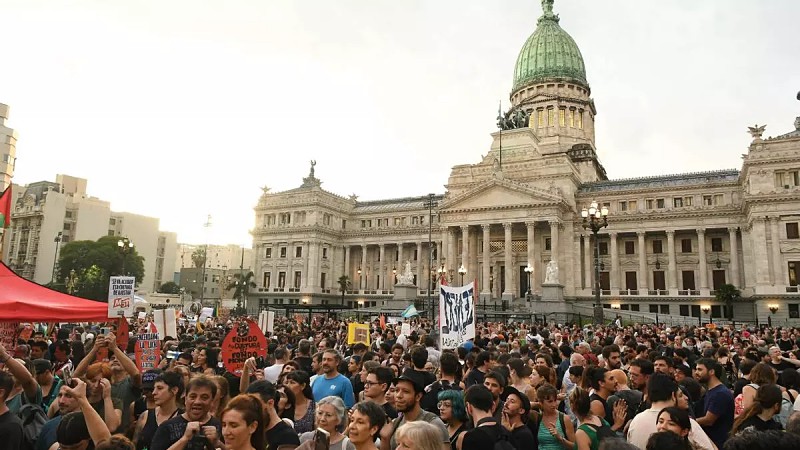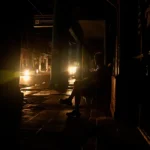
The amended Basic Law was approved this week by the Argentine Chamber of Deputies, after more than 24 hours of debates and votes. The government had to leave numerous reforms along the way, and the text went from more than 600 articles in the original “omnibus law” to just 232.
The law includes great benefits for economic power, seeking to refound the country in favor of the powerful with fiscal adjustment, privatization, labor and pension reform, among other predatory items..
By Bruno Falci, from Buenos Aires, for Portal O Cafezinho
Hundreds of protesters once again occupied Congress Square, in the face of a strong intimidating police apparatus, while deputies debated the new Basic Law and tax reform. At the same time, the national government is trying to enforce anti-picketing protocol, with the Federal Police preventing protesters from moving away from Congress Square and into the street.
The fight is not over yet. On May 1st, several parties and unions will participate in the action on the streets of Buenos Aires, together with sectors of combative unionism, neighborhood assemblies and student movements. A second general strike is scheduled for May 9th.
Final battle will be in the Senate
The vote was with 142 votes in favor, 106 against 5 abstentions, after more than 20 hours of session. The government had to leave numerous reforms on the way, and the text went from more than 600 articles in the original “omnibus law” to just 232.
Despite this reduction, the path is opened for the scrapping of the State, loss of historical rights given to the working class and an uncontrolled increase in recession and unemployment. Argentina’s fate will have to be decided in the Senate.
It was an intense day with mobilization of sectors of the General Confederation of Labor (CGT), the Central of Argentine Workers (CTA) and the Peronist and left-wing parties in rejecting the treatment of the package of laws. Once the private vote is over, a half-sanction will be obtained, which will then have to go to the Senate to become law and where the presence of the Peronist opposition is very strong.
After approving it in general, the government and the collaborationist opposition voted on all the chapters of a counter-reform that attacks the historic rights of workers; rewards employers who have unregistered work; easier, cheaper and more discriminatory dismissals; more exploration in the field; more experimental period and the figure of “collaborators”. The left fought in the Chamber of Deputies and in the streets.
Towards precariousness
One of the most controversial chapters of the law refers to the approval of the so-called
Delegation of Powers. It will allow Milei to govern by decree in administrative, economic, financial and energy matters. It is being challenged on the spot as it is considered unconstitutional. Seen as an amendment to democracy, it is now up to the Senate to decide on its validity.
The Administrative Reorganization of the State reform was approved. It will allow Milei to modify or dissolve public organizations to her liking, for example the National Disability Agency.
Privatizations of public companies were approved The chapter includes a package of public companies subject to total privatization (4), concessions (5) and which must maintain the state majority (2).
The Public Employment chapter was approved. It involves an attack on state workers, loss of job stability, among other issues.
The chapter dedicated to Contracts and Concessions (public works) gives the executive branch greater freedom to change public works contracts.
There is also labor laundering with tax benefits for employers who do not have their workers registered
The approved chapter relating to Labor Reform aims to revoke aggravated compensation for unregistered workers.
Increase the probationary period (from 3 months to 6 and even 12 months), legalize labor outsourcing, enable discriminatory dismissals.
Severance fund, for “easier and cheaper” dismissals.
“Collaborators”: companies with up to 5 workers can lose rights and become “collaborators” and monotax (without vacations or bonuses or licenses).
Greater precariousness in agricultural work.
Various derogations, including obtaining double compensation if they have not registered, as well as precariousness for workers in private residences.
Not that it is about Energy, the total liberalization of exports and imports in terms of hydrocarbons was approved. Companies can export without guaranteeing domestic supply. It’s a big deal for big conglomerates.
Delivery of special powers to the Government to regulate energy activity. The State is prevented from intervening in setting prices for any of the segments of the hydrocarbon chain.
Finally, the Large Investment Incentive Regime (RIGI) comes into force, which grants huge tax benefits to large investments. A direct benefit to large multinationals and transnational capitalist groups and giving them free availability of dollars until 2038. The mining, oil and knowledge economy sectors are especially benefited. deepen extractivism and depredation of territories with open-pit and lithium mining through the looting of multinationals.
“Opponents who do not oppose”
Voices of all kinds resounded in some media, especially those denouncing the general plan of Javier Milei and his cronies against the working class and popular sectors.
One of these voices was that of Juan Grabois, leader of Pátria Grande (of the Peronist coalition União Pela Pátria – UxP) and the Union of Workers of the Popular Economy (UTEP). Invited to the program “Whatever happens” on Radio Con Vos, Grabois said about the approval of the Basic Law:
“It is a very sad day. If you read the law, article by article, there is not one in favor of the country, in favor of the people”. And, in this sense, he questioned the non-governmental sectors, “opponents who are not opposed”, who voted in favor, acknowledging that he hoped this would not happen.
The leader stated:
“It is very difficult to achieve victories in this context. Very difficult. Does this mean we shouldn’t fight? No, we have to fight and I believe that the social movements, the union movement, the student movement are fighting and, in the long term (…or in the short term), the situation will turn around.”
Source: https://www.ocafezinho.com/2024/04/30/argentina-camara-aprova-plano-de-milei-decisao-final-e-no-senado/

